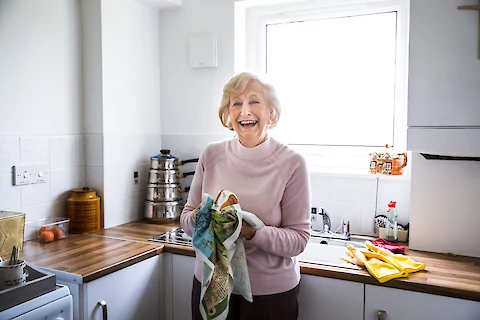
The kitchen is one of the most frequented places in a household. For seniors to lose their independence making their own meals or simply grabbing a drink, can be a disheartening experience. Luckily, Senior Helpers South Orange County has ways to adapt their kitchen so that they can age in place safely and stress-free.
Kitchen for Those Living With Mobility and Sensory Impairments
As we age, our bodies experience muscle and bone loss which hinders the ability to do simple tasks such as walking or stepping over items. Losing these functions can put our senior loved ones at risk of falling and breaking bones. Along with physical impairments, elderly people may experience sensory changes like sight and hearing loss.
How to Adapt Kitchens for Them
- Decluttering. First and foremost, decluttering is the easiest and most efficient thing to do. It may be hard for seniors to let go of certain things but having clear countertops will prevent the possibility of things falling to the floor and tripping over them.
- Make handles more accessible. Rather than using round knobs which can be difficult for individuals with arthritic hands, use wide cabinet handles. Reaching over the sink and having to pull at the faucet can be difficult while in a wheelchair. Try installing touchless faucets instead. Additionally, for those who use wheelchairs, seek expert help from manufacturers like General Electric who sell ADA-compliant kitchen appliances.
- Keep common items nearby. Keep the most frequently used kitchen items like dishware, pots, pans, and towels within arm's reach and not where they would have to bend down or stand on their tippy-toes.
- Use pull-out shelving. This will make it easier for them to access things. Having a pull-out shelf with organized snacks or kitchen items will not only help mobility but also allow them to see better.
- Use adaptive kitchenware. Loss of motor functions can be difficult for them to eat or make food. There are plenty of adaptable kitchen utensils that can be swapped out with old ones.
Neurological Disorders and Cognitive Impairments
Aging individuals usually experience mild cognitive impairments like being forgetful or unable to learn as fast as they used to. Sometimes, these symptoms worsen into diseases like Alzheimer's, neuropathy, Parkinson's, and mild or even severe strokes. Dealing with the progression of these disorders can trigger the decline of both mental and physical health. However, adapting to these changes will improve that.
How to Adapt Kitchens to Those Living with Cognitive Impairments
- Improve the eating environment. If someone with dementia is in a comfortable, calm, and quiet eating area they are more likely to eat and feel better, ultimately affecting their wellbeing. Severe dementia cases impact seniors' ability to remember how to chew and swallow.
- Clear storage. Having clear jars with snacks, tea, and coffee will allow them to find what they are looking for easier. You could even install clear cabinets.
- Labels. Labeling cabinets, drawers, bins, and even cleaning items will also aid in their ability to find things more quickly.
- Change lighting. LED lights are less strenuous on the eyes and will help them maneuver around the kitchen easier.
- Throw out confusing items. If there is fake fruit, sharp kitchen gadgets that are hard to use, or alcohol in the kitchen, remove it all. They could injure themselves or have perception issues and become confused about what it is.
Whether they have mobility issues or cognitive impairments, reevaluating your loved one's current kitchen situation is always a good idea to maintain their quality of life. Senior Helpers South Orange County believes no matter where they are, your loved ones deserve comfort and compassion.